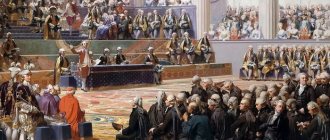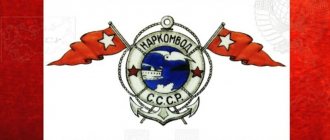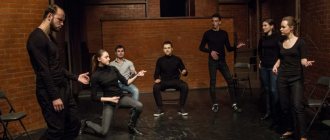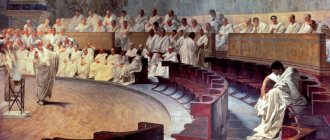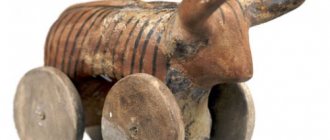Oratory has an ancient history, its roots stretch back to the times of Ancient Greece. Epochs and rulers changed, but the essence of the art of eloquence remained unchanged. To become great, a speaker must be able to persuade, to make the audience believe even the most unthinkable ideas.
It is the power of persuasion that lies at the heart of oratory. It sounds easier in words than in practice. To become a good speaker, you need to master many different tactics and methods of persuasion. And, no less important, master your emotions, facial expressions, movements: control them during a performance and use them to achieve the desired effect.
This can be learned - for example, in rhetoric courses organized by the Benefis theater studio. During the lessons you will learn how to hold the attention of the public, convince them that you are right, and how to competently answer awkward questions. We will be engaged in speech production: your voice will sound confident, you will learn how to influence the audience using various intonations and gestures. This article will talk about the great speakers of past eras and modern times, whose speeches were listened to by thousands of people with bated breath.
Interesting facts about Demosthenes
Demosthenes was born in Ancient Greece, in the city of Athens. Despite the fact that at that time the skill of eloquence was known to the Egyptians, Assyrians, and Indians, Hellas is the birthplace of oratory.
The whole life of Ancient Greece was saturated with the speeches of orators: generals gave incendiary speeches to the troops, politicians spoke at council meetings and mass gatherings, citizens who were guilty of something, through their ability to speak, defended their rights in court, and any person, wishing so, could perform at a friendly meeting, funeral or celebration. And by and large, the ability to express oneself eloquently for every person was by no means a whim, but a vital necessity.
There were quite a few genres of public speeches, but the deliberative genre of speech was the most popular and significant; in other words, political eloquence was especially valued. If the speaker achieved success in his business, the prospects of obtaining a good position in the government apparatus and even the opportunity to go as ambassador to another country opened up before him. And there is nothing strange in the fact that Demosthenes dreamed of becoming an orator since childhood.
Demosthenes’ father (by the way, his namesake) was a representative of the respected bourgeois class and the owner of two workshops, where several dozen slaves made furniture and weapons. When Demosthenes was seven years old, his father died, leaving his sister and himself a substantial fortune. But the people who were entrusted with the responsibility of raising young orphans (Demosthenes’ sister was only five years old at that time) were not only selfish and greedy in nature, but did not take any part in their upbringing, and, accordingly, there could be no payment for teachers out of the question. So, Demosthenes was a weak child and lagging behind in physical development, and also seriously stuttered and burbled.
Even in adolescence, Demosthenes persuaded his teacher to take him to a court hearing at which one of the famous orators spoke. The applause and delight of the audience, captivated by the speaker, then made an indelible impression on Demosthenes. This, in fact, served as the motivation for him to study public speaking on his own.
Considering that there were more than enough people teaching eloquence in Athens at that time, Demosthenes was able to find a mentor. For four years he was a student of Isei, a man who had the status of one of the best teachers in oratory. It was from Isaeus that Demosthenes subsequently adopted the manner of asking rhetorical questions, the strict logic of proof, meaningfulness, conciseness and simplicity of style.
During his studies, Demosthenes became properly acquainted with the works of eminent philosophers and historians such as Plato and Thucydides. Demosthenes rewrote Thucydides’ “History” with his own hand eight times, which is why he managed to learn it by heart.
Subsequently, Demosthenes, like many other speakers of that era, including Isaeus, initially began to write judicial speeches for other speakers, and only after successfully completing this task did he move on to his public speeches. But this is where the story gets even more interesting.
The most famous speakers of our time
The great orators in the history of mankind of all times were famous for the fact that they never stopped improving themselves for a moment and were faithful to speech activity all their lives.
Abraham Lincoln
Lincoln was no exception, although he attended school for one year. He read a lot, engaged in self-development and could easily discuss with the most educated people of his century. As a speaker, at first he was timid and constrained, but after a couple of minutes in public he relaxed, spoke confidently and from the heart. He wrote his speeches in everyday affairs on any piece of paper, put them in a hat and wore them until there was time to sort everything out and prepare material for the report.
Winston Churchill
The outstanding politician Winston Churchill said that the most significant talent is oratory. The British politician, like some orators of antiquity, suffered from a speech impediment. But his lisp did not stop him from becoming a heart-tugging broadcaster. Churchill was not afraid to show emotions in his speech, he used short and simple words, which brought himself closer to the people. He understood the power of humor and used it wisely in his speeches, creating a good mood for those around him.
Adolf Gitler
Not all famous speakers from ancient times to the present day were “positive” characters in history. Adolf Hitler must be recognized as one of the masters of skillful speech. He had an excellent command of German dialects and seemed like a fellow countryman to all the peoples of Germany. Willpower and a piercing gaze attracted the listener to Hitler and forced him to blindly listen to ideas. The Fuhrer studied psychological persuasion and knew the correct postures and gestures that made the performance believable. He began his speech calmly and detachedly, gradually increasing the pace, and by the end he was already clearly expressing emotions and using acting. Hitler became one of those who devoted himself entirely to a monologue, spending a lot of energy and emotions.
Vladimir Lenin
Vladimir Ilyich Lenin is a man who spoke the same language with the people, our compatriot and another master of rhetoric, who can safely be considered one of the great orators of the 20th century. Lenin did not propose ideas in which he himself did not believe. Charisma and confidence in the correctness of one’s thoughts were found not only on stage, but also in everyday life. He spoke with energy and confidence, interacted with the crowd and received “feedback” from them every time. He used simple words that were accessible to the people, and was on an equal footing with them. However, the desire to express everything that was in his heart made his speech chaotic and overly emotional. He changed intonations and moods several times during the performance.
Steve Jobs
There are still great speakers today. Steve Jobs became an example of the fact that public speaking is also useful in business. Jobs is popular not only as the founder of one of the largest companies of the 21st century, but also as a successful presentation presenter. He mastered rhetoric and competent presentation of the product. Jobs convinced hundreds of people of the need for a brand and believed that confident and clear speech was the key to sales success. He deliberately left several questions unanswered in his speech in order to begin a dialogue with the audience. Steve Jobs walked around the stage, joked and anticipated questions from the audience. Laconism and simplicity were visible in all the affairs of this man.
Vladimir Putin
One cannot help but include the current president of our country, V.V. Putin, among the great orators of Russia, whose persuasive manner is impossible to doubt. The manner of his speech is noticeably different from previous speakers, because he speaks with restraint, balance and consistency. Gestures smoothly and measuredly, stands calmly in place. It is also typical for him to joke in a manner familiar to his mentality. Ironic answers sometimes live a separate life from the famous politician.
All masters of words are different, each had and still has an individual storytelling style, conversation tactics and acting skills. Some coped with the difficulties of speech, others put it at the forefront. We all have one thing in common – perseverance and hard work. Many years of work on oneself, developing rhetoric skills, developing charisma.
Not only politicians and journalists use oratory in their work.
It helps businessmen, tour guides, teachers, coaches, diplomats, etc. in their work. Rhetoric courses from the Benefis theater studio have various directions that are designed to meet the specific needs of students. If your goal is to gain basic knowledge in this area and learn to communicate effectively with friends, peers and colleagues, sign up for a standard course. If your goal is to charm a wide audience with your charisma, winning a storm of applause, sign up for a course with an acting focus. If you want to not only speak effectively, but also learn how to write strong texts, sign up for a course in classical rhetoric. Find out more about the courses
Demosthenes' correction of his speech
Demosthenes' debut suffered a complete collapse - the audience laughed at him, constantly drove him off the stage and never allowed the newly minted speaker to finish. This is explained quite logically: Demosthenes spoke barely audibly, “chewed” words, lisped and stuttered. And the non-verbal side of the speech left much to be desired - every now and then the speaker’s shoulder twitched, and he himself behaved painfully funny in public. But Demosthenes was persistent and spoke for the second time at a public meeting, but even here a fiasco awaited him, after which the frustrated speaker, lost in spirit, went home.
Then, according to legend, Demosthenes decided to start working on himself and resume performing at the suggestion of his friend, who was a famous Athenian actor. Demosthenes told his friend about his failures and the sorrows associated with them, saying that people did not value him and did not understand his profundity at all. After listening to him, the actor asked his friend to read something from Sophocles or Euripides, which he did.
At the end of the speech, the actor repeated the same passage, but so expressively and well that Demosthenes for a moment thought that he was hearing completely unfamiliar verses. So he realized that expressive speech has beauty and makes one want to listen to the speaker, and he decided to use any conceivable and inconceivable means to get rid of his speech deficiencies.
A little later, Demosthenes retired into seclusion, and so as not to want to break the promise he had made to himself, he shaved his head by half. He decided to exercise every day for several hours until the hair on his head grew back. One of his exercises was to put small pebbles in his mouth and try to speak clearly and clearly. And in order to develop breathing and vocal strength, he read poetry loudly while climbing the mountain. He also walked along the seashore and spoke so loudly that his voice drowned out the sound of the surf.
To get rid of burr, Demosthenes bought a puppy, and then listened to its growl and repeated the sounds made by the dog. The speaker decided to overcome the twitching shoulder with a truly unusual method - using a sharp sword. The weapon was suspended from the ceiling, and Demosthenes rehearsed, positioning himself so that the tip of the sword touched his shoulder every time it twitched. In this way he was able to gain control over his body. As for gestures and mastery of space, Demosthenes, in order to remain free during performances, took lessons from his actor friend.
All this allowed Demosthenes to become a true professional in his field.
Later life of Demosthenes
It is important to note that by the time Demosthenes became an adult, practically nothing remained of the fortune left by his father. His guardians allowed him to take only a house full of slaves, and left the lion's share of the property and money for their loved ones. Demosthenes made attempts to return what was owed to him, but this did not yield any results. As a result, he decided to obtain the stolen property through the courts. But in order to be able to win in court, it was necessary, firstly, to know the laws of Athens perfectly, and secondly, to be able to speak brilliantly.
And the first independent step for Demosthenes was precisely this trial, where he made speeches addressed to unreliable guardians. This process continued for five years, during which the thieves tried to evade responsibility by destroying the will written by Demosthenes the Father, as well as a number of other significant documents. But, despite all attempts to avoid punishment, the guardians were convicted. And, despite the fact that the young master of eloquence was not able to return everything that was owed to him, in the process of a protracted trial he was able to strengthen his character and become a persistent and persistent person.
By the age of thirty, Demosthenes was already taking part in state affairs, and directed all the power of his oratorical potential against the scourge of all the inhabitants of Hellas - the Macedonian ruler Philip. Demosthenes managed to create an anti-Macedonian coalition of Greek city-states, and also twice received the status of first strategist and was the head of state. The people's assembly even awarded the honorary Athenian a wreath, which was a great honor.
Over the following years, Demosthenes made speeches in the national assembly, with which he awakened true patriotism in his fellow citizens (the fiery speeches of the speaker against Philip, by the way, were called “Philippics”). But the end of Demosthenes’ life was not rosy - he was accused of false denunciation, for which reason he was sentenced to death. As a result, Demosthenes was forced to hide in the temple of Poseidon, located on the island of Kalavria, and after the Macedonians seized power in Greece, he poisoned himself.
Demosthenes is a great personality and orator.
Demosthenes is a great personality and orator.
(about 384-322 BC)
Demosthenes , an Athenian statesman and great orator, devoted his entire life to his homeland and died in the struggle for its freedom. He was born in Athens in 384 BC. e. His father (whose name was also Demosthenes) was a wealthy man who owned a weapons workshop.
Read more about Aristotle here.
When the boy was seven years old, his father died, leaving the future speaker and his five-year-old sister a large fortune as an inheritance.
The upbringing of the child was entrusted to the mother and guardians; the guardians (his maternal uncles), however, turned out to be unscrupulous people. They did not pay salaries to teachers, did not care about the education of children and upbringing. The boy grew up weak and physically underdeveloped.
When Demosthenes reached adulthood, his guardians gave him only a house with slaves, and appropriated most of his money and property. The young man first tried to persuade his guardians to voluntarily return the inheritance, but they refused. Then he decided to seek the return of the stolen money in court. To successfully conduct a case in court, you needed a thorough familiarity with Athenian laws, and most importantly, the ability to speak well and convincingly.
In Athens, almost every citizen had to speak in court and in the people's assembly. Outstanding speakers enjoyed universal respect: they were chosen for honorary positions and sent as ambassadors to foreign countries; Many people appeared who taught eloquence: how to win arguments, how to make a weak argument stronger.
The most outstanding teachers of eloquence at that time were Socrates and Iseus. Socrates ran a school of eloquence at home, but Demosthenes could not attend classes because the tuition fees were too high. Then he turned to Isey, at that time the best lawyer in inheritance cases.
You can read more about Socrates here.
For four years the young man studied diligently with Isei and paid him a large sum of money for his studies. During this time he became well acquainted with the works of all outstanding writers; He especially carefully studied the works of the famous historian Thucydides and the philosopher Plato. The future speaker knew the “History” of Thucydides almost by heart, since he rewrote it eight times with his own hand.
After completing his studies, Demosthenes began to sue his guardians. The trial dragged on for five years. The guardians tried their best to avoid responsibility; Thus, they even destroyed the will of Father Demosthenes and other important documents. In the end, the guardians were convicted, but the young man was unable to fully recover his inheritance.
A difficult long-term struggle with his guardians strengthened the character of the future speaker, developing in him perseverance and perseverance.
Demosthenes dreamed of speaking before the people as a boy. Once, in his early youth, Demosthenes begged his teacher to take him to a court hearing to listen to the speech of the famous orator. The boy saw how a crowd of people applauded the speaker, and was amazed at the power of eloquence that conquered everyone. Since then, he gave up all other activities and games with his peers and began to intensively practice eloquence. He firmly decided to become a speaker.
But, before speaking before the people, Demosthenes had to, following the example of his teacher, write judicial speeches for others. Such an occupation paid quite well in Athens, and the young man managed not only to feed his mother and sister, but also to make some savings.
However, composing speeches could not satisfy Demosthenes: he was an ardent patriot and dreamed of devoting his energies to social activities.
The young speaker's first speech before the people ended sadly: the noise, laughter and hiss of the crowd did not allow him to finish his speech. This failure was completely natural, since Demosthenes had a very weak voice, spoke slurredly, stuttered slightly, lisped (did not pronounce the sound “r”), he had a bad habit of twitching his shoulder, and, in addition, he did not know how to behave in front of an audience at all .
His second attempt to make a speech before the national assembly was also unsuccessful. Lost in spirit, covering his face, he hurried home and at first did not even notice that one of his friends, a famous Athenian actor, was following him.
Demosthenes began to bitterly complain to a friend about his failures and said that the people did not appreciate or understand the deep content of his speeches. “That’s all true,” answered the actor, “but I’ll try to help your grief. Read me some passage from Sophocles or Euripides.” Demosthenes read. When he finished, the actor repeated the same thing, but with such expressiveness that Demosthenes thought he was hearing completely different verses. He now realized how much beauty comes from expressiveness, which he lacked, and set to work with redoubled zeal.
So, Demosthenes decided to correct all the shortcomings of his speech at all costs. So that no one would disturb him, he retired; Then he shaved half his head so as not to leave the house until his hair grew back. He practiced exercises for several hours a day to correct unclear pronunciation.
He put pebbles in his mouth and tried to speak loudly and clearly; to learn how to pronounce the sound “r”, he took a puppy, listened to its growl and repeated the sounds. He taught himself to recite poetry loudly when he climbed a mountain or walked along the seashore, and tried to drown out the noise of the waves with his voice. Sometimes the young man did not go out for two or three months, until he finally completely mastered his voice and gestures.
After long and persistent efforts, Demosthenes achieved his goal and became an outstanding orator. However, he never spoke without preparation, but always learned by heart a pre-written speech; at night, by the light of a lamp, he diligently prepared for his speech, carefully considering every word. All this subsequently gave rise to the opponents of the great orator to reproach him for the lack of inspiration and natural abilities. Once one of his enemies even reproached him: “Your speeches smell like oil,” that is, “You sit over them all night long in the light of an oil lamp.”
But even his enemies were finally forced to recognize the strength and skill of his eloquence. In his speeches, extraordinary simplicity of expression was combined with the greatest power of feeling and thought, clarity and persuasiveness. Demosthenes always strictly adhered to the subject of his speech and did not like empty chatter; He either spoke calmly, influencing the minds of his listeners, or conquered them with the power of feeling, conveying to them his ardent faith in the correctness of the cause he was defending.
When Demosthenes was 30 years old, he began to take part in state affairs and turned all the power of his oratorical talent against the Macedonian king Philip. Selfless love for his homeland inspired the great orator to fight against the Macedonians in Athens and throughout Greece.
Until recently, Macedonia was a weak and backward state, with which the Greeks had little regard. King Philip (359-336 BC) united the country and organized a large, well-armed army. In the hands of such a gifted commander as Philip, she became a formidable force.
The situation in Greece at this time was very difficult: the Greeks waged constant wars among themselves, the Athenians fought with their allies, the Thebans with the Phocians, and the Spartans with the states of the Peloponnese.
First, Philip subjugated Thessaly and strengthened himself in Northern Greece. But that was only the beginning. After some time, the Macedonians managed to capture all Athenian possessions in Thrace, and they were preparing for the invasion of Central Greece.
Demosthenes assumed the danger Macedonia and its king posed to Athens and Greece, and led the party of patriots.
In Athens at this time, power was in the hands of supporters of Macedonia. The Macedonian party was led by Eubulus and the famous orator Aeschines.
Eubulus was for peace “at any cost, at any cost” and deliberately turned a blind eye to the danger that threatened from the Macedonian king. He wanted to reassure the citizens by distributing the income of the state treasury to the people (the so-called “spectacle money”).
Demosthenes began to fight against this order and called on the people to give up their personal benefits of the day for the happiness and salvation of their homeland. “The rich,” he said, “throw handouts to the people at the expense of the state, while they themselves evade state duties. The speaker managed to convince the people to spend “spectacular money” on the fight against Macedonia. This was a significant success for Demosthenes and his patriotic supporters.
Demosthenes now constantly spoke in the national assembly with fiery speeches, trying to awaken patriotic feelings in the Athenians. His famous speeches against King Philip were called “philippics.”
After the capture of Thrace, Philip began to threaten Olynthos, the largest city in Chalkidiki.
Ambassadors of the Olynthians arrived in Athens asking for help. Demosthenes warmly supported the Olynthians: he made three speeches in their favor at the national assembly. However, the help of the Athenians was late. King Philip captured the city and sold the inhabitants into slavery.
Philip then offered peace to the Athenians. The Athenian ambassadors - Philocrates and Aeschines - were bribed by the king during peace negotiations: despite the opposition of Demosthenes, they made peace on terms unfavorable for Athens. Soon after this, not paying attention to the concluded peace, Philip defeated the Phocians, allies of the Athenians.
Then, finally, the Athenians began to prepare for a decisive rebuff to Philip. Demosthenes was chosen as the first strategist and became the head of the state. The former ambassador Philocrates was accused of bribery and treason. Philocrates was sentenced to death in absentia.
Then Demosthenes spoke out against another ambassador, Aeschines, accusing him of treason and bribery. Aeschines skillfully defended himself and was acquitted by a slight majority.
This was the time of the greatest success and glory of the great orator. He managed to strengthen the fleet - the main force of the Athenians. However, the Athenians alone could not cope with the formidable enemy, and therefore Demosthenes began to assemble a pan-Greek alliance against Macedonia. At the head of the embassy, he toured a number of Greek states, everywhere making passionate speeches and encouraging the Greeks to unite. “The strength of the Macedonians,” he said, “is in the weakness and disunity of the Greeks; if all the Greeks are united, then Philip will not dare to attack us.” The population of the Greek cities enthusiastically received the great orator, and soon Corinth, Megara and other cities of the Peloponnese entered into an alliance with the Athenians.
Philip, meanwhile, closely watched the actions of the Athenians. While these negotiations about unification were ongoing, terrible news arrived: Philip’s army was in Central Greece, the king had already occupied the fortress of Elatea, an important crossing point of the roads to Thebes and Attica, on the border of Boeotia. The decisive moment of the struggle had arrived. Much now depended on whose side Thebes, one of the strongest states in Central Greece, would take.
Demosthenes, at the head of the Athenian embassy, arrived in Thebes with a proposal for an alliance against Philip. But there were already Macedonian ambassadors there (the king had preceded him), who, not skimping on promises, did their best to dissuade the Thebans from an alliance with the Athenians. However, Demosthenes achieved brilliant success. His inspired speeches, in which he called for courage and reminded of the glory and honor of Greece, decided the matter: the Thebans entered into an alliance with the Athenians against a common enemy. Both sides began to prepare for the final battle.
In the summer of 338 BC. e. The fatal battle of Chaeronea took place.
At dawn, both troops lined up in battle formation. The right wing of the Macedonian army was commanded by Philip himself, the left by his eighteen-year-old son Alexander, the future great commander; in the center stood the experienced military leader Antipater.
A furious battle began. For a long time, military happiness did not lean in either direction. Alexander was the first to achieve decisive success: his warriors dealt a crushing blow to the “sacred detachment” of the Thebans. On the contrary, on the right wing the Athenians broke through the ranks of the Macedonians and pushed them back. "Behind me! - cried the Athenian strategist, - the victory is ours!
Intoxicated with success, the advancing Athenians, however, upset their ranks. “The enemy does not know how to win!” - said Philip, who was watching the progress of the battle from above. He quickly reorganized his phalanx and attacked the Athenians. The Athenians wavered, and the entire Greek army began to retreat. The Macedonians won a decisive victory, despite the desperate resistance of the Athenian hoplites and the undaunted courage of the Theban phalanx (“sacred band” of 300 men, who all died).
In this battle, the Athenians lost 1,000 people killed and 2,000 captured.
Demosthenes fought as an ordinary hoplite and retreated from the battlefield along with his army. For this, the orator Aeschines subsequently accused him of cowardice. The Athenians, however, did not believe the slander of the enemies of the great orator and instructed him to deliver a funeral speech in memory of the soldiers who fell at Chaeronea, which was considered a high honor.
The news of the defeat at Chaeronea made a stunning impression on the Athenians. A national assembly immediately convened, the people passed a resolution to prepare for a siege and transport women and children from the villages outside the walls of the city; in addition, someone proposed to free the slaves and give the right of citizenship to foreigners for conscription into the army. The Athenian national assembly did not dare to take such an extreme measure even at such a dangerous moment.
Demosthenes, together with his supporters, organized the defense of the city.
The terrible danger, fortunately, soon passed; it was possible to conclude peace on relatively acceptable terms: the fleet and main possessions were left to the Athenians; however, the Athenian Naval League - the basis of their power - was dissolved, and Athens had to join the newly organized pan-Greek league led by Philip. The Battle of Chaeronea decided the fate of Greece: the Greek states lost freedom and independence, everywhere power passed into the hands of the rich who sympathized with Macedonia.
In Athens, traitors, open and secret supporters of Philip, raised their heads. They began to bring charges against Demosthenes and other representatives of the popular party almost daily.
However, there were patriots who worked tirelessly to restore the power of the state. They were led by Demosthenes, Lycurgus and others.
Lycurgus, within four years, through strict economy, again raised state revenues to 1,200 talents per year. Demosthenes was in charge of the “spectacular treasury,” which was now the only support for the Athenian poor. The Athenians began to gradually recover from the terrible defeat.
King Philip, meanwhile, convened a pan-Greek congress in Corinth, where he solemnly proclaimed the creation of a pan-Greek union under the leadership of the Macedonian king. In the midst of preparations for the campaign, Philip was killed at the wedding of his daughter in the city of Aegae in Macedonia, two years after the Battle of Chaeronea (336 BC).
Demosthenes received information about the death of Philip when the popular assembly did not yet know about it. He appeared before the council and joyfully announced that he had seen a dream that foreshadowed great happiness for the Athenians. Soon the news of Philip's death arrived. The people's assembly decided to offer a sacrifice of gratitude to the gods, and to reward the king's killer with a wreath. The great orator came to the people's assembly that day in festive clothes with a wreath on his head, although his own family suffered great grief: just a few days ago his daughter died. But Demosthenes put people's joy above personal grief. The people rejoiced, hoping to throw off the Macedonian yoke.
Demosthenes was again called to power. In all the cities of Greece, a movement arose against the Macedonians and hopes for freedom arose. The Athenians sent an embassy to Thebes and other Greek states proposing an alliance against Macedonia. Athens also entered into relations with the Persians, prompting them to immediately start a war with Alexander. Demosthenes believed that Philip's heir would be easy to deal with; he hoped for the success of the uprising.
Contrary to expectations, Alexander quickly put an end to his opponents in Macedonia and Thessaly and forced the Greeks in Corinth to recognize himself as the leader of the all-Greek army for the campaign against Persia. However, first he had to undertake a campaign to the north against the tribals, who threatened the borders of Macedonia.
Taking advantage of Alexander's absence, the Thebans were the first to rebel, followed by other Greek states. The Thebans besieged the Macedonian garrison they had and killed many soldiers.
Alexander, having defeated the tribals, unexpectedly appeared with an army under the walls of Thebes. The city was taken and destroyed to the ground. Only the house that belonged to the famous poet Pindar was spared. The surviving inhabitants, numbering about 30 thousand people, were sold into slavery.
There was terrible confusion in Athens: they expected Alexander to begin a siege. However, at the cost of complete submission, they managed to beg for mercy from the winner. Alexander demanded only the extradition of Demosthenes and other opponents of Macedonia.
Demosthenes came to the people's assembly and told the people a fable about sheep who gave their dogs to wolves. He compared himself and his comrades to dogs fighting for the people, and called Alexander a wolf. Fortunately, Alexander's attention was diverted by preparations for the Persian campaign, and he did not insist on his demand. Demosthenes and his friends remained in Athens.
Setting out on a campaign against Persia at the head of 30 thousand infantry and 5,000 horsemen. Alexander defeated the Persians in the battles of Granicus and Issus (334-333); then he completely defeated the Persian army at Gaugamela (on the banks of the Tigris River) and took possession of Babylon and the huge treasures of the Persian kings.
Meanwhile, the Macedonian party again came to power in Athens. Now the opponents of the great orator found the time opportune to deal with him. The fact is that a few years ago one of the supporters of the people's party proposed to crown Demosthenes with a golden wreath for his high patriotic merits.
The People's Assembly agreed with this and decided to award the great citizen of Athens with a wreath. Of course, the supporters of Macedonia objected, and Aeschines brought a complaint against the resolution of the assembly to the jury; he argued that the decision of the national assembly was incorrect and declared that Demosthenes did not deserve such a high reward.
Demosthenes was forced to defend himself. The trial turned into a duel between the two most famous orators of Athens. The enemies of the great orator did not take into account, however, the mood of the people, who did not want to put up with the loss of independence.
The trial began in front of a huge crowd of people. Aeschines delivered an accusatory speech full of unfair attacks on Demosthenes. In the famous acquittal speech “On the Wreath,” the great orator gave an overview of all his activities for the good of his homeland and vividly outlined the treacherous course of action of Aeschines. Despite pressure from opponents, the judges handed down a fair verdict. Aeschines was fined and had to go into exile. The success of the speech “On the Wreath” was not only a victory for the great orator, but also a triumph of patriotic forces in Athens and throughout Greece.
As a result of his victory at the trial, Demosthenes' influence on state affairs increased. However, now, taught by bitter experience, he acted cautiously. He saw the strength of the enemies and the lack of unity among the Greeks and therefore tried to keep his fellow citizens from sharp, thoughtless actions against the Macedonians. For example, the Athenians, on his advice, did not support the Spartan uprising. This uprising was quickly suppressed by the Macedonians.
Alexander, meanwhile, was entirely occupied with Asian affairs, leaving complete control in Greece to his commander Antipater. However, he sent two orders to Greece: firstly, he ordered to honor himself as a god and, secondly, he ordered all Greek states to return their exiles. The Greeks laughed at the first command, but the last caused great indignation. The fact is that the exiles were usually traitors hated by the people.
At this time, a new event occurred that fatally affected the fate of Demosthenes.
Alexander's treasurer, Harpalus, taking advantage of the king's long absence from Babylon (the king then began his campaign in India), stole the huge treasury of the Persian kings. With this money, he recruited 6 thousand mercenaries and unexpectedly arrived in the Athenian harbor of Piraeus with 30 ships. The treasurer tried to win over Athenian statesmen with money, promising them the opportunity to achieve independence for Greece.
Some speakers proposed taking Harpalus's money and immediately starting a general uprising in Greece against the Macedonians. However, Demosthenes and other famous figures spoke out against it.
Harpalus was not allowed into Athens, and he went to the Peloponnese to Cape Tenar. There he left his army and most of the treasures, and, taking with him 750 talents, he returned to Athens. Now he only asked for asylum.
Meanwhile, Antipater and Alexander's mother Olympias demanded that the Athenians hand over the treasury thief. At the suggestion of Demosthenes, Harpalus was detained, and the money he brought was deposited in the Acropolis for safekeeping, in order to return it later to Alexander. Harpalus managed to escape to Crete, where he was soon killed.
When they counted the money seized from Harpalus, it turned out that out of the amount he brought, only 350 talents remained, the rest of the money disappeared somewhere. Demosthenes offered to carry out a strict investigation of this matter, and he guaranteed with his life that he was innocent of embezzlement of money. Massive searches were carried out, but no money was found.
Demosthenes and some other persons were brought to trial by representatives of the Macedonian party on charges of embezzling money, bribery and arranging the escape of Harpalus. Under pressure from opponents, the court found Demosthenes guilty and sentenced him to pay 50 talents. Since he could not pay such a huge sum, he was imprisoned. Friends, however, soon helped him escape, and he found refuge near Athens on the island of Aegina, overlooking his native land.
Shocked by the overwhelming struggle with his opponents, the great orator painfully experienced his exile; his health was completely shaken. Demosthenes bitterly complained to his friends about the injustice of the verdict: he, an impeccably honest man with great services to the state, was convicted, and some notorious scoundrel who was accused along with him was acquitted.
However, the exile of the great orator turned out to be short-lived: news of Alexander’s death in Babylon unexpectedly arrived (June 323 BC).
Alexander's death served as a signal for the start of the liberation movement throughout Greece. An uprising also broke out among the Greeks of Asia Minor. The rise even captured wealthy people who had previously supported the Macedonians. Popular speakers made patriotic speeches in Athens, urging their fellow citizens to throw off the Macedonian yoke. An embassy was sent from Athens to the Peloponnese to encourage the Peloponnesian states to join the struggle for freedom.
The Athenian National Assembly decided to return the great orator from exile. A state ship was sent to the island of Aegina to fetch him. When Demosthenes entered his native land, he was given a national ceremonial welcome in the Athenian harbor of Piraeus, as a national hero.
Demosthenes immediately led the resistance against the Macedonians. A war began, which at first went well for the Athenians. The Athenian commander Leosthenes, who had previously been the head of the Greek mercenaries among the Persians and was released by Alexander, led 8,000 soldiers to Thessaly against Antipater; Along the way, the Athenians were joined by the Aetolians and Thessalians. The allies won a decisive victory over Antipater, who with the remnants of the army locked himself in the fortress of Lamia (in Thessaly). During the siege of Lamia, the Athenians, however, suffered a grave misfortune: Leosthenes fell.
After his death, the war dragged on and took an unfavorable turn for the Athenians. The allied army consisted of citizens of different Greek states and mercenaries. First, disagreements began among the allies, and then the mercenaries, who were sloppily paid, began to scatter.
The commander Leonnatus came with his army to the aid of the besieged Antipater. The Athenians bravely marched towards Leonnatus and defeated him. However, commander Craterus arrived from Macedonia with new reinforcements. The superiority of forces was now on the side of the Macedonians. In addition, the Athenian fleet was defeated twice, and the naval power of Athens was broken.
The Macedonians managed to persuade some of the Athenians' allies to make peace. The Athenians were left almost alone. But still they decided to give the last battle. The battle took place at the city of Crannon (August 322 BC). The Athenians were defeated, although not as severely as at Chaeronea. A peace had to be concluded, the conditions of which were very difficult: democracy in Athens was destroyed; full political rights were granted only to wealthy citizens (numbering 9,000); the rest could leave their homeland and move to Thrace; The Macedonian garrison occupied the Athenian harbor.
Demosthenes and other patriots were sentenced to death in absentia. Demosthenes managed to escape to the temple of Poseidon on the island of Kalavria.
There were also traitors who voluntarily took up the search for the fugitives. Among these traitors, the most vile person was a certain Archius, who was formerly an actor, who even received the nickname “fugitive hunter.”
Having learned that Demosthenes was on the island of Kalavria in the temple of Poseidon as “pleading for protection,” Archias arrived there with Thracian mercenaries and hypocritically invited Demosthenes to go with him to Antipater, assuring that he would not do anything bad to him. In response, Demosthenes said: “Archias, just as your acting did not touch me before, so now your promises do not touch me. Wait a little, I’ll write something to my family...”
With these words, Demosthenes went inside the temple, took a piece of papyrus and a reed pen, as if about to write; then he raised the pen to his mouth and bit it, as he usually did when he was thinking about something, preparing to write. The reed feather contained a powerful poison, which Demosthenes swallowed.
Having crossed the threshold of the temple, he staggered and fell dead. This happened on October 12, 322 BC. e.
This is how Demosthenes died , not wanting to survive the enslavement of his homeland, for the freedom and independence of which he fought until his last breath.
Soon the Athenians erected a copper statue of Demosthenes in the city square. Demosthenes was represented on it with a mournful expression on his face and his hands clenched in despair.
The inscription under the statue read:
“If you had such power, Demosthenes, as intelligence, Macedonian Ares would not have been able to take power in Hellas.”
About forty original speeches of Demosthenes have survived.
Greek oratorical prose reached the pinnacle of its development in them.”
Read more about Cicero here.
…………………………………………………………..
If you want to quickly gain the most necessary, basic knowledge for building your new, professional performance at your next event, then get my video course “The ABCs of any speech” by clicking on the banner below
If you liked and found this article useful, please leave your comment below and share with your friends. Your opinion is important to the author of the site. Thank you in advance, Elena Fateeva
.
